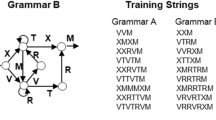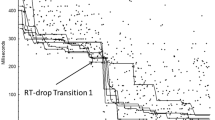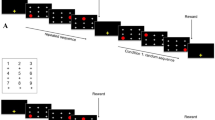Abstract
Two experiments examined performance in a sequence learning task. Participants were trained on a repeating sequence which was presented as a visual display and learning was measured via the increase in reaction time to respond to a new sequence. Some participants made a response to each stimulus while others merely observed the sequence. In Experiment 1 participants responding to the display via a keypress showed learning, but those merely observing did not. Five possible reasons for the failure to find observational learning were considered and the Experiment 2 attempted to resolve these. This second experiment confirmed the findings of Experiment 1 in a non-spatial sequence display using a cover story which encouraged attention to the display but not rule-search strategies. The results are discussed in relation to applied and theoretical aspects of implicit learning.
Similar content being viewed by others
Author information
Authors and Affiliations
Additional information
Received: 20 December 1999 / Accepted: 16 March 2000
Rights and permissions
About this article
Cite this article
Kelly, S., Burton, A. Learning complex sequences: no role for observation?. Psychological Research Psychologische Forschung 65, 15–23 (2001). https://doi.org/10.1007/s004260000034
Issue Date:
DOI: https://doi.org/10.1007/s004260000034




